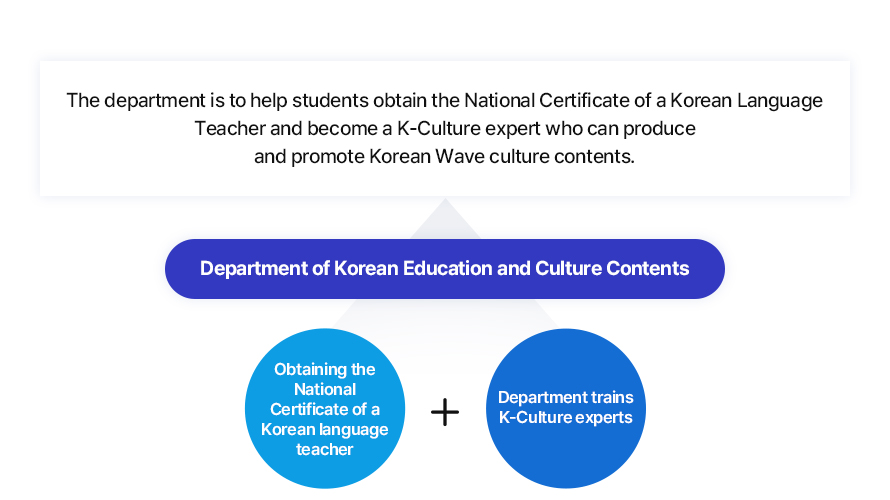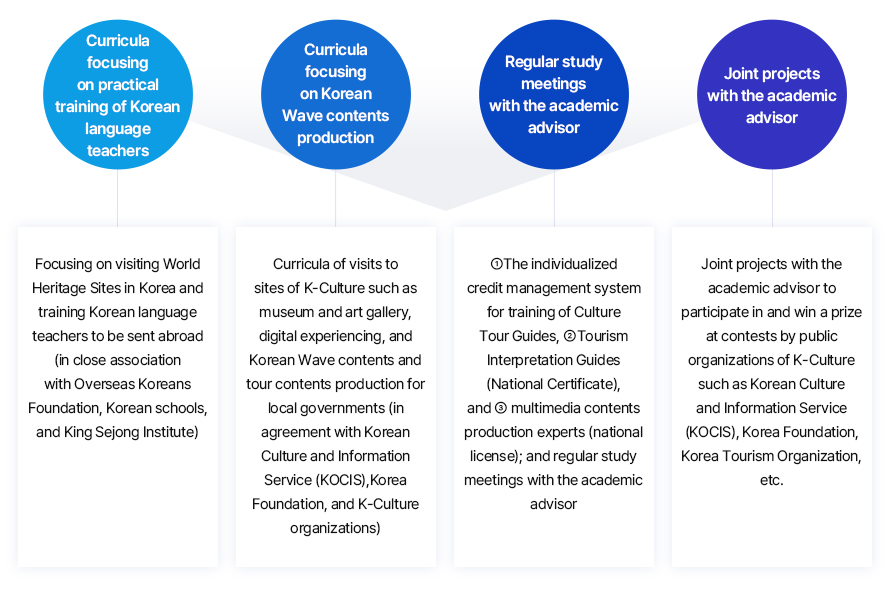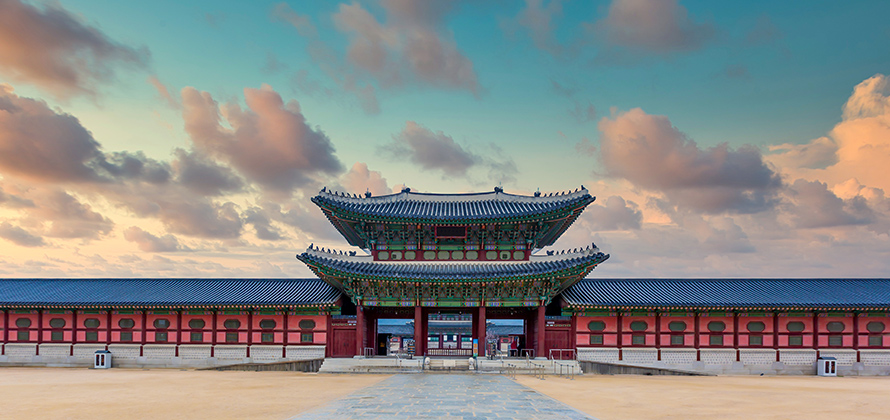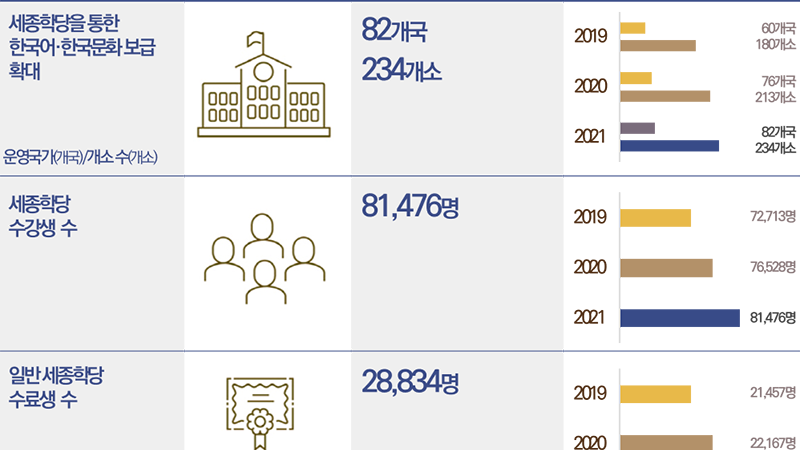International Language & Culture
Be the true leader of this era who practices love.
Korean Education and Culture Contents
Department of Korean Language and Culture
Foreign learners are able to develop their ability to speak, listen, read, and write in Korean from basic to mid/high-level courses, and they are aided to grow into experts in the Korean language and Korean cultural content based on a broad and deep understanding of Korean language and culture.
Department of Korean Language Education
In the golden age of global Korean Wave culture, Korean language education experts will be trained to distribute Korean language and culture to the world through the acquisition of a national certificate of Korean language teaching that will allow them to teach Korean to foreigners at home and abroad.
Educational Objectives by Major
1. Department of Korean Language and Culture
2. Department of Korean Language Education
Acquisition of Grade 4 Korean Language Proficiency
 Show large image
Show large imageThe department is to help students obtain the National Certificate of a Korean Language Teacher and become a K-Culture expert who can produce and promote Korean Wave culture contents.
Department of Korean Education and Culture Contents
- Obtaining the National Certificate of a Korean language teacher
- Department trains K-Culture experts
Characteristics of each department
Systematic curriculum from specialization in Korean language proficiency and Korean culture
understanding to Korean language teaching certification
1. Department of Korean Language and Culture
- Provides a systematic curriculum tailored to learner levels and learning objectives
- Education that makes Korean language skill learning quick and easy and improves Korean culture understanding
- Improvement of proficiency from everyday to professional Korean language with various educational content
- Provision of interesting lectures on traditional culture and contemporary trends in Korea
- Systematic step-by-step courses using the latest teaching techniques
- Improvement in speaking, listening, reading, and writing skills through step-by-step learning from beginner to advanced levels
- The teaching of practical Korean expressions that can be used in various specialized fields
- Flexible lecture compositions for those who both work and study
- Various offline Korean lectures and online Korean culture experiences that are available anywhere in the world at all times
- Subject content subtitles provided for foreigners
- English syllabi and teaching plans so foreigners can learn easily
 Show large image
Show large image
Curricula focusing on practical training of Korean language teachers- Curricula focusing on Korean Wave contents production
- Regular study meetings with the academic advisor
- Joint projects with the academic advisor
- Focusing on visiting World Heritage Sites in Korea and training Korean language teachers to be sent abroad (in close association with Overseas Koreans Foundation, Korean schools, and King Sejong Institute)
- Curricula of visits to sites of K-Culture such as museum and art gallery, digital experiencing, and Korean Wave contents and tour contents production for local governments (in agreement with Korean Culture and Information Service (KOCIS), Korea Foundation, and K-Culture organizations)
- ①The individualized credit management system for training of Culture Tour Guides, ②Tourism Interpretation Guides (National Certificate), and ③ multimedia contents production experts (national license); and regular study meetings with the academic advisor
- Joint projects with the academic advisor to participate in and win a prize at contests by public organizations of K-Culture such as Korean Culture and Information Service (KOCIS), Korea Foundation, Korea Tourism Organization, etc.
2. Department of Korean Language Education
- Establishment of a differentiated curriculum for the training of Korean language instructors
- Provision of content specialized for the national certification course of Korean language instructors
- The opening of a sufficient number of courses by diversifying educational content
- Selective learning of subdivided fields such as Korean expression and pronunciation
- Provision of a systematic curriculum tailored to learner levels
- The operation of field-oriented and organized Korean language education practice
- Close guidance from professors in charge of practitioners
- Various online and offline academic club activities
- Visits to the KBS Korean Language Promotion Agency and other related educational sites
Certificates and Diplomas
| Korean language education | Level 2 Korean language teaching certification (national certification) |
|---|---|
| Korean language and culture | Cultural tourism commentator and tour interpretation guide (national certification) |
| Multimedia content production expert (national certification) | |
| Korean Language Proficiency Test (TOPIK) Level 4 (Graduation Requirement for Foreign Students) |
* Certification preparation classes and individual credit management system: Support provided through supervisors and regularly given special lectures
Department scholarship benefits
Grade scholarship, academic support scholarship, department service scholarship, overseas training support scholarship, club management scholarship, social media management scholarship, TOPIK level 6 scholarship
Career path by department
1. Department of Korean Language and Culture
- Employment into Korean and global companies, K-culture content experts
- Interpretation and translation experts, tour interpretation guides
- Advancement into graduate schools at home and abroad for admission into a master's course in Korean language education or the Korean Wave culture industry
2. Department of Korean Language Education
- After graduation, acquisition of national certification for Korean language teaching (Level 2), work as a Korean language instructor and multicultural expert at home and abroad through domestic multicultural institutions, the Sejong Institute, the National Institute of Korean Language, the Korea Tourism Organization, and the Overseas Koreans Service
Foreigners learning Korean at King Sejong Institute (Source: KBS Docu)
2. Employment to companies related to participating in competitions such as the Korea Culture Information Service (KOCIS), the Korea Foundation (KF), and the Korea Culture Exchange Promotion Agency
Korean Culture and Information Service (KOCIS)
(Source: Korean Culture and Information Service (KOCIS))2022 Korean Foundation for International Cultural Exchange promotion image
(Source: Korean Foundation for International Cultural Exchange)
3. Students can work at such organizations as King Sejong Institute, National Institute of the Korean Language, and Korea Tourism Organization as a K-Culture teacher. Students also can participate in contents production projects or commence work as a K-Culture expert.
Metaverse Campus
(Source: King Sejong Institute)Korea where the tradition and present coexist
(Source: Korea Tourism Organization)
4. Students can enter a graduate school in Korea to take a master course related to Korean education or the Korean Wave culture industry.
Departmental Activities
- Exploration of Korean culture and visits to sites of the Korean Wave culture industry Offline meetings for students
- Socializing and information sharing through orientations, school trips, first week/last week gatherings
- Cultivation of knowledge through special lectures by experts and special lectures on Korean cultural trends
- Special offline lectures in preparation for exams and certifications
- Student cooperation program to support adjustment to college life in the early stages of new and transferred students
- Various programs such as sports competitions and talent shows to strengthen networks among current students and graduates


